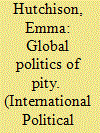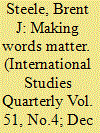| Srl | Item |
| 1 |
ID:
130984


|
|
|
|
|
| Publication |
2014.
|
| Summary/Abstract |
The study of emotion has become a steadily growing field in humanitarian actions. This essay adds to the field through a further empirical examination of the political roles emotions can play. Specifically, the essay questions how emotions were implicated in the construction of transnational solidarity-and the associated humanitarian actions-following an event of pivotal global importance: the Asian tsunami disaster of December 2004. To this end, I focus on the emotional dimensions of dominant media tsunami imagery and examine how emotions helped to produce the humanitarian meanings and ideologies on which the subsequent solidarity and humanitarian actions were based. Analyzing photographs in the New York Times, the essay demonstrates that the dominant tsunami imagery helped to evoke solidarity and garner aid. It did so, at least in part, through mobilizing stereotypical and deeply colonial representations of developing world disaster that are suggestive of a "politics of pity." In this way, the essay contributes both an empirical study of emotions in world politics and an examination of the linkages between emotions and contemporary humanitarianism.
|
|
|
|
|
|
|
|
|
|
|
|
|
|
|
|
| 2 |
ID:
079952


|
|
|
|
|
| Publication |
2007.
|
| Summary/Abstract |
Prominent communicative approaches to humanitarian crisis assume that international action is constrained by definitional disagreement. Yet interpretive agreement is not always enough to stimulate states into acting. Reflexive discourse is an alternative form of communicative action, and it occurs when international actors (state, nonstate, or suprastate) generate insecurity in powerful states, and stimulate these states into actions that they might initially be reluctant to pursue. By calling out the discrepancy between a targeted state's actions and its biographical narrative, reflexive discourse challenges a targeted state's self-identity and thus illuminates the interest such a state has in confronting certain crises. I use the American response to the recent Asian Tsunami, reviewing how then U.N. Undersecretary-General for Humanitarian Affairs Jan Egeland inadvertently used reflexive discourse by suggesting that Western nations were being "stingy" with their initial aid offers. This (in part) prompted the United States, albeit with much indignation, to increase by twenty times its aid to the affected areas. I then posit how a reflexive discourse strategy might have been used to persuade the United States into acting to confront the genocide in Darfur
|
|
|
|
|
|
|
|
|
|
|
|
|
|
|
|